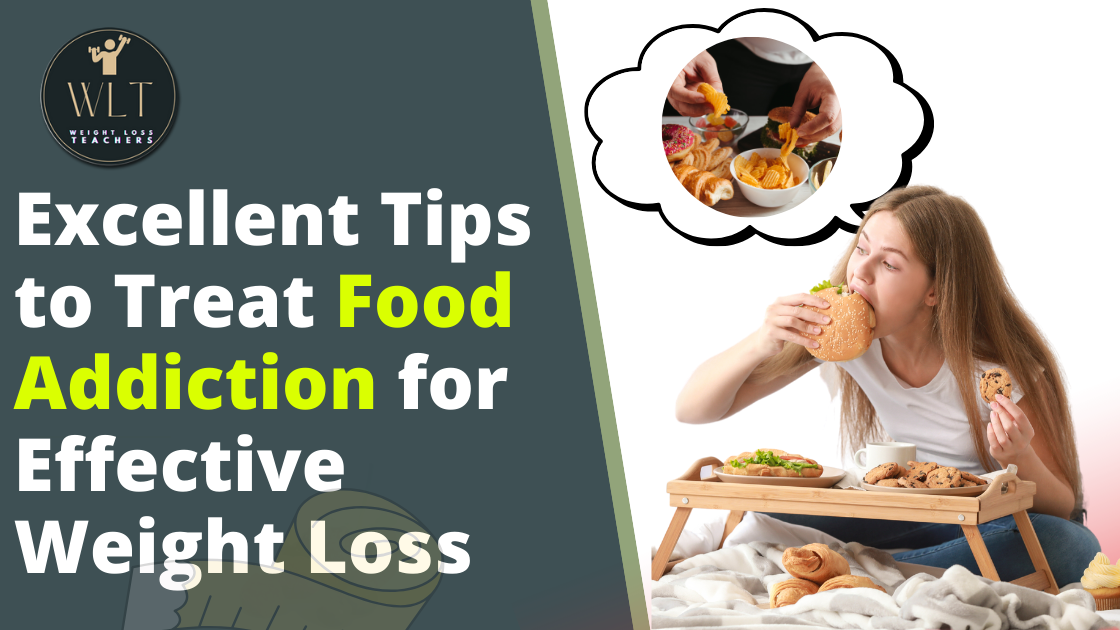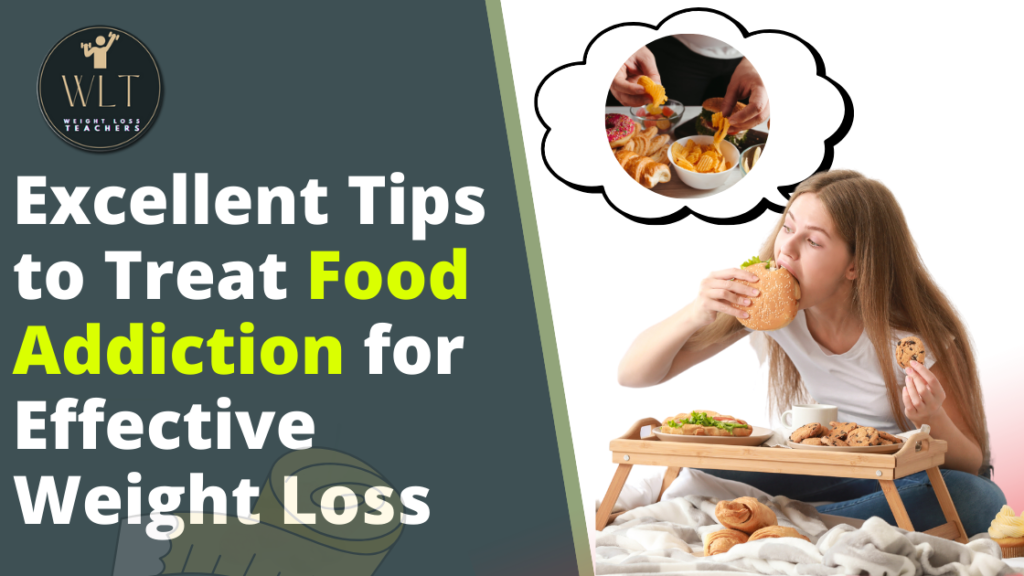
Excellent Tips to Treat Food Addiction for Effective Weight Loss

Food addiction has become increasingly common in today’s fast-paced world, resulting in negative health consequences, including weight gain and obesity. Food addiction is a complicated disorder characterized by an uncontrollable yearning for specific foods, a loss of control over eating patterns, and persistent overconsumption, which frequently leads to weight-related problems.
Table of Contents
Introduction
This thorough article attempts to analyze successful strategies on how to treat food addiction and determine effective interventions for treating food addiction, supporting long-term weight loss, and overall well-being.

Understanding Food Addiction
Food addiction is a compulsive relationship with eating that is similar to substance addiction. It is characterized by a loss of control over eating patterns, persistent cravings for certain foods (typically high in sugar, fat, or salt), and continuing intake despite detrimental physical and mental health repercussions. In terms of neurobiological processes and behavioral patterns, food addiction is similar to other addictive illnesses such as drug or alcohol addiction. Individuals with food addictions, unlike those with chemical addictions, must learn to control their relationship with food while still satisfying their vital nutritional demands.
Food Addiction Symptoms

Understanding food addiction’s signs and symptoms is critical for early intervention and determining the best strategies for treating food addiction. Typical symptoms of food addiction include:
Food preoccupation: Constant thoughts about food, excessive meal planning, or obsessive thinking about the next opportunity to eat.
Loss of control: Difficulty in stopping or controlling how much food is ingested, even when physically full or experiencing unpleasant consequences.
Cravings and powerful urges: Strong, uncontrollable cravings for specific types of food, which are frequently highly processed or heavy in sugar, fat, or salt.
Emotional eating: Using food to find comfort, relieve stress, or as a coping method for negative emotions.
Withdrawal symptoms: irritation, mood fluctuations, or physical discomfort when cutting back on or eliminating particular meals.
Social withdrawal and humiliation: Avoiding social interactions involving food out of fear of losing control, as well as feelings of guilt and shame associated with overeating.
Connection Between Food Addiction and Weight Gain
Let us elaborate on the relationship between binge eating and weight gain so that you understand why it is crucial to treat food addiction for weight loss in a better way.
- Function of Reward Pathways

Food addiction is inextricably tied to the brain’s reward system, which involves the production of dopamine, a neurotransmitter associated with pleasure and reward. Highly appetizing and processed foods high in sugar, fat, and salt can cause an excessive release of dopamine, resulting in heightened pleasure and encouraging the desire for more of these foods. This can lead to desensitization of the brain’s reward pathways over time, requiring bigger amounts of food to reach the same level of satisfaction. As a result, those who are addicted to food may overeat, resulting in weight gain and an increased risk of obesity.
- Psychological Aspects

Psychological aspects are important in the development and maintenance of food addiction. For example, stress can cause overeating as a coping mechanism, resulting in the production of “feel-good” neurotransmitters that temporarily alleviate negative emotions. Melancholy, loneliness, or boredom are common causes of emotional eating, which can result in a cycle of relying on food for comfort. Furthermore, dissatisfaction with one’s body image and cultural expectations to achieve a certain weight or appearance can contribute to disordered eating patterns, including food addiction.
Effective Strategies to Treat Food Addiction For Weight Loss
If you are looking for effective strategies on how to treat food addiction for weight loss, proceed with the following points:
- Diagnostic Evaluation and Assessment

Accurate food addiction diagnosis and assessment are critical for effective treatment. Healthcare professionals may use a variety of screening tests and questionnaires to evaluate the severity of food addiction and its effects on a person’s physical and emotional well-being. An investigation of eating habits, psychological symptoms, and medical history may be included in assessments. A thorough evaluation assists in tailoring treatment programs to the specific needs of the client, ensuring that the most appropriate therapies are used.
- CBT (Cognitive-Behavioral Therapy)

Cognitive-Behavioral Therapy (CBT) is a popular way to treat food addiction for weight loss. CBT attempts to identify and modify dysfunctional food-related thoughts and behaviors, increase self-awareness, and establish healthy coping mechanisms. Individuals can challenge their negative food attitudes, learn to recognize overeating triggers, and create effective craving management methods using effective techniques on how to treat food addiction, such as self-monitoring, cognitive restructuring, and behavioral experiments.
- Meditation and Mindfulness

Mindfulness-based therapies show potential in the treatment of food addiction by improving self-regulation and decreasing impulsive eating behaviors. Paying nonjudgmental attention to the present moment, including thoughts, feelings, and body sensations, is what mindfulness entails. Individuals can develop a stronger awareness of hunger and fullness cues, engage in conscious food choices, and boost satisfaction from smaller portions by adopting a mindful eating practice. Meditation practices like body scans and mindful breathing can help with stress reduction and mental well-being, reducing the need for eating as a coping mechanism.
- Nutritional Advice

Nutritional therapy is essential in the treatment of food addiction and the promotion of weight loss. Registered dietitians may assist people in developing balanced meal plans, identifying trigger foods, and learning about the nutritional worth of various food options. They may stress the benefits of eating full, nutrient-dense meals while also catering to unique dietary needs and preferences. Nutritional therapy may also include skills for overcoming food cravings, such as mindful eating, quantity control, and introducing rewarding alternatives into the diet.
- Peer Support and Support Groups

Participating in support groups or seeking peer assistance is an important part of the recovery journey from food addiction. Connecting with others who have gone through similar situations gives you a sense of belonging and understanding, which reduces feelings of loneliness and shame. Support groups can provide a forum for people to share their struggles, triumphs, and recovery strategies. Online groups and forums can be a convenient and easy method to interact with people, trade resources, and receive support along the way.
- Pharmacology

Pharmacotherapy may be explored as an addition to behavioral therapies for food addiction in some circumstances. To help lower cravings, change reward pathways, and support the management of underlying psychological issues, medications such as naltrexone, topiramate, or bupropion may be administered. Pharmacotherapy, on the other hand, should always be taken under medical supervision, and the possible advantages and hazards should be carefully weighed on an individual basis.
Long-Term Lifestyle Changes to Treat Food Addiction
In order to treat food addiction for weight loss, you may have to incorporate some long-term habits into your lifestyle.
- Exercise and Physical Activity

Regular physical activity and exercise are essential for weight management and addiction treatment. Exercise has a profound impact on mental well-being, in addition to the obvious benefits of burning calories and helping weight loss attempts. When people engage in physical activity, the body releases endorphins, also referred to as “feel-good” hormones. These endorphins can greatly enhance mood and lessen cravings, which is especially important for those in recovery from addiction.
Finding activities that are enjoyable and correspond with individual tastes and physical abilities is one of the keys to long-term adherence to a workout plan. Exercise becomes less of a chore and more of a gratifying experience when it is pleasurable. It could be anything from dancing to hiking to cycling to swimming to participating in a sport. Adding variety to the routine can also keep things interesting and reduce monotony, making it more likely that people will continue with it over time.
Individuals who incorporate physical activity into their daily lives not only improve their general health and well-being but also provide a constructive outlet for managing stress and emotions, ultimately aiding their journey toward a healthy relationship with food and their bodies.
- Stress Management Methods

Stress management skills are essential for avoiding emotional eating and efficiently managing food addiction. Stress can be a big trigger for using food as a coping method, which can lead to poor eating habits. Individuals can deal with unpleasant emotions by adding certain stress reduction practices to their daily routine.
Deep breathing exercises, for example, are basic yet effective stress-reduction approaches. The body’s stress response is reduced by focusing on slow, deep breaths, generating a sense of peace and relaxation.
Another powerful way to reduce tension and stress in the body is through progressive muscle relaxation. It requires tensing and relaxing various muscle groups in order to induce physical and mental calm.
Yoga and meditation have also been demonstrated to be useful in terms of stress reduction and awareness promotion. These techniques urge people to be present in the moment, which can help break the cycle of emotional eating and raise awareness of one’s moods and food-related behaviors.
Implementing stress management techniques not only aids in the control of food addiction but also improves general well-being. Individuals can handle problems without reverting to poor eating behaviors by adopting healthier coping methods, supporting long-term weight loss attempts and establishing a more balanced relationship with food.
- Sleep Quality

Sleep hygiene is a collection of behaviors and habits that encourage good sleeping patterns. Poor sleep quality or insufficient sleep can disturb hormonal balance and negatively affect appetite management, making proper sleep hygiene vital for treating food addiction.
To treat food addiction for weight loss, you must prioritize proper sleep length because it helps regulate appetite hormones like ghrelin and leptin, which play a role in hunger and satiety. When these hormones become imbalanced as a result of insufficient sleep, it can contribute to overeating and poor food choices.
Maintaining a consistent sleep schedule, going to bed and waking up at the same time each day, is part of practicing excellent sleep hygiene. This regimen aids in the regulation of the body’s internal clock, making it simpler to sleep and wake up naturally.
Creating a sleep-friendly environment is also important for supporting peaceful sleep. This could include keeping the bedroom cold, dark, and quiet, investing in a comfortable mattress and pillows, and minimizing screen time before bedtime to avoid electronic device interruptions.
Relaxation techniques used before bed can help people unwind and prepare their brains and bodies for sleep. Reading, having a warm bath, or practicing mindfulness can all help promote relaxation and improve sleep quality.
Individuals can enhance their sleep quality by prioritizing sleep hygiene, which in turn improves their eating habits. Adequate and relaxing sleep promotes general well-being and improves an individual’s capacity to properly control food addiction.
Note: There might be affiliate links mentioned here. We may receive a commission if you purchase a product through an affiliate link. There is no additional charge for you. Please do your own research before making any online purchases.
Tips for Quick Recovery and Avoiding Relapse
While following the best strategies on how to treat food addiction, you may relapse sometimes. Use the following tips for quick recovery and preventing relapse.
- Goal Setting and Self-Monitoring

Self-monitoring is an essential component of eating disorder recovery that entails keeping track of many aspects of one’s journey. This method includes documenting emotions, triggers, and progress toward recovery goals in addition to food consumption. Individuals can acquire useful insights into patterns and tendencies that may have contributed to their eating issue by continuously observing their behaviors and emotional responses. Self-monitoring promotes increased awareness of these behaviors and feelings, allowing individuals to detect when they are reverting to old habits and take proactive efforts to avoid relapse.
Setting goals is another important aspect of the rehabilitation process. Setting realistic and attainable objectives, both short-term and long-term, gives people a sense of purpose and direction. Short-term goals allow for incremental growth while also creating confidence and motivation. Long-term goals, on the other hand, provide a wider picture and a purpose to stick with recovery even through difficult periods.
It is critical to evaluate progress on a regular basis to ensure that individuals stay on track with their recovery path. They can celebrate victories, identify areas for growth, and make required adjustments to their tactics by monitoring their progress against specified targets. This constant evaluation acts as a significant source of motivation, supporting the resolve to overcome the illness.
Furthermore, goal planning and self-monitoring can be empowering for people in recovery. It switches the emphasis from feeling helpless in the face of an eating disorder to actively taking care of one’s life and health. This sense of agency is essential to healing and developing a meaningful relationship with oneself.
Overall, self-monitoring and goal setting are complementary disciplines that support one another. Monitoring behaviors and emotions generates essential data for developing realistic objectives, while goal setting offers the self-monitoring process purpose and direction. Individuals can create resilience and continue their recovery process by incorporating these activities into their daily lives.
- Relapse Prevention Techniques

Developing effective relapse prevention methods is critical to preserving long-term progress and decreasing the chance of setbacks throughout the road of eating disorder recovery. While relapses are discouraging, they also provide opportunities for learning and progress. Implementing well-thought-out methods can considerably improve an individual’s capacity to handle difficult situations and effectively deal with triggers.
Recognizing high-risk circumstances is an important first step in relapse prevention. Individuals can develop proactive techniques to avoid or manage disordered eating behaviors by recognizing situations or environments that may trigger them. This may entail avoiding specific triggers or adopting coping skills to help you manage these circumstances more effectively.
Relapse prevention requires the development of coping skills. This entails providing individuals with alternate coping mechanisms for stress, anxiety, and unpleasant emotions. Cognitive-behavioral therapy (CBT) and dialectical behavior therapy (DBT) might be useful tools for building effective coping skills. These approaches can aid in the replacement of unhealthy behaviors with better ones, promoting resilience in the face of hardship.
Creating a strong support network is also essential for long-term rehabilitation. Surrounding oneself with supportive and understanding people, such as friends, family, or support groups, can provide encouragement, validation, and a sense of belonging. Having friends to lean on through difficult times can be extremely beneficial in preventing relapse and staying focused on the road to recovery.
Self-care is an often overlooked but powerful part of relapse prevention. Participating in activities that promote physical, emotional, and mental well-being can help increase overall stability and resilience. Regular exercise, adequate sleep, balanced eating, and participation in hobbies or creative outlets can all help reduce stress and improve mood.
Relapses can happen despite your best efforts. It is critical to face such situations without self-judgment. Individuals can learn from relapses and acquire insight into triggers and weaknesses instead of considering them failures. Seeing setbacks as chances for growth and self-discovery can enhance resilience and strengthen one’s commitment to recovery.
Finally, recognizing when professional assistance is required and obtaining it as soon as possible is critical. Eating disorder therapists, counselors, and support groups can provide specialized direction and assistance, assisting clients in overcoming obstacles and maintaining steady progress. They can guide you with personalized strategies on how to treat food addiction.
FAQs
What exactly is food addiction, and how is it different from other addictive disorders?
Food addiction is a medical disorder defined by an overwhelming desire for specific foods, a loss of control over eating behaviors, and chronic overconsumption. Individuals must learn to regulate their relationship with food while still satisfying their nutritional demands, which distinguishes it from other addiction diseases.
What are the symptoms and indicators of food addiction?
Common symptoms of food addiction include obsession with food, lack of control, cravings, emotional eating, withdrawal symptoms, social withdrawal, and embarrassment associated with overeating.
How can food addiction affect weight gain?
Food addiction can result in weight gain because people overeat, particularly highly delicious and manufactured meals. The reward system of the brain, as well as the release of dopamine, play an important part in reinforcing cravings and overeating.
What is cognitive-behavioral therapy (CBT), and how does it aid in the treatment of food addiction?
Cognitive behavioral therapy (CBT) is a treatment method that assists individuals in identifying and changing dysfunctional attitudes and behaviors connected to food addiction. It aids in the development of self-awareness, the management of triggers, and the learning of healthier coping skills.
Can mindfulness and meditation aid in the recovery from food addiction?
Yes, mindfulness and meditation skills can help in food addiction treatment. They encourage self-regulation, raise awareness of hunger and fullness cues, and provide alternate coping mechanisms for stress and emotions.
How can nutritional therapy help with food addiction management?
Nutritional counseling assists people in creating balanced meal plans, identifying trigger foods, and making healthier food choices. It also discusses ways to fight food cravings and encourages the adoption of long-term eating habits.
Are there support groups for people suffering from food addiction?
Yes, support groups offer vital peer support and a sense of community to people suffering from food addiction. They provide a forum for people to share their stories, exchange resources, and get encouragement during the recovery process.
Is medicine used to treat food addiction?
Medication may be provided as an adjuvant to behavioral therapies for food addiction in some circumstances. They can aid in the reduction of cravings, the modification of reward pathways, and the treatment of underlying psychological issues. Medication, on the other hand, should always be provided under medical supervision.
How significant is physical activity in overcoming food addiction and assisting with weight loss?
Physical activity is important for weight management and addiction treatment. It aids in the burning of calories, the improvement of mood, and the reduction of cravings. Finding pleasant forms of exercise improves the chances of long-term adherence.
What are some successful methods for sustaining recovery and avoiding relapse from food addiction?
Strategies for sustaining recovery include self-monitoring, setting realistic objectives, developing coping skills, establishing a support network, utilizing stress management techniques, prioritizing sleep hygiene, and getting professional assistance when necessary. Learning from relapses without self-judgment is also essential in the recovery process.
Conclusion
Treating food addiction for weight loss necessitates a multidisciplinary strategy that addresses the condition’s physiological, psychological, and behavioral elements. Individuals need to learn certain strategies on how to treat food addiction for effective weight loss. They can recover control over their eating behaviors, accomplish lasting weight loss, and improve their overall well-being by applying evidence-based interventions such as cognitive-behavioral therapy, mindfulness techniques, nutritional counseling, and lifestyle changes. Individuals can overcome food addiction, avoid relapse, and embark on a better and more meaningful life journey with the help of a comprehensive treatment plan and continuing support.
Disclaimer: The information provided in this article is for educational purposes only and should not be considered as a substitute for medical advice. Consult a healthcare professional before implementing any home remedies or making significant changes to your lifestyle.






